
So back in May, I spent 8 days and 7 nights at the Fort at No. 4 up in Charlestown, NH. I was there for a number of reasons. First, they needed someone to do a cooking demo for a few school groups going through, and that’s entirely my wheelhouse. Second, there was a Rendezvous going on (sort of an 18th century “con”) and they wanted people in the Fort. Third, and perhaps most important, I wanted to teach myself how to bake in a beehive oven.
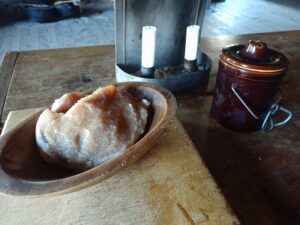
The Fort is a wonderful and very magical place. It does have running water in the bathrooms (cold only, and only in the summer), and the bathrooms are set up outhouse style (you have to go out of the fort to a small two stall privy to use them). There is electricity in some of the buildings, but when I’m there I rarely use it other than to charge my phone (which I do in a staff room that is not open to the public, during the day when I’m not using it). I do use the fridge in the staff room for keeping food from going off, but only because there is no root cellar there for me to keep things in. If there was, I probably wouldn’t use the staff room at all.
So, in spending a week at the Fort, I learned a number of things about myself. First and foremost, my stress level went down tremendously when I wasn’t reading FaceBook and the news. About the end of the third day, living in a one room cabin and sleeping on a rope bed began to feel like the “new normal” and I settled in very nicely. The rope bed has a lovely, fluffy down feather tick mattress, over which I laid my sheepskins so that the pin feathers didn’t prick my bottom while sleeping. It was still a bit chilly in Charlestown during the evenings, so I was happy to have the warmth of the fireplace radiating beside my bed. If I had wanted, I could have kept the fire going all night, but I didn’t see the point. The residual heat from the beehive oven actually kept it quite dry and comfortable (outside was a bit moist and cool). I learned that sleeping on the rope bed, my shoulder ceases hurting almost entirely… but my hips go out of whack instead and I must pinch a nerve. Apparently I should spend a every other night flipping between my bed and a rope bed to get the best sleep possible. LOL!
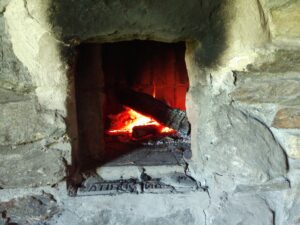
I learned that you get up early because there’s light, and you go to bed early (for me at least, because I’m a night owl usually) because there isn’t light. The cabin I’m in is lit entirely by the hearth and candles. I have a large candelabra, several smaller candle stands, and a few lanterns. Most nights, I burned a single candle and not much more, because there didn’t seem much point. The one night I was attempting to finish a sewing project, I actually lit up six candles in the candelabra, and that was enough light to allow me to complete my work. It was interesting, seeing the way my body adjusted when I cut out electric light from my life.
The entire time I was there, I dressed as a Fort dweller. I wore a petticoat (a skirt) or two depending on the temperature, and a bedgown (which is a type of blouse that ties or pins closed), a chemise that covered my elbows but not my lower arms, and a frilly cap that covered most of my hair. I wore an apron the entire time, partly to keep my bedgown closed and partly because much of what I was doing was dirty.
I cleaned the house I was staying in. I swept at least twice a day, and always found more dust. It’s a hazard of burning wood – the ash gets everywhere. I washed dishes in the dry sink, with water heated over the fire in a tin kettle. I cooked over the fire in cast iron pots and a spider (basically a frying pan on legs, that allows you to cook over the coals). If I didn’t make a fire, I didn’t eat cooked food, so I made a fire every day. I carted my water in from elsewhere in the Fort. I washed myself in the evenings over a bucket in front of the fire.
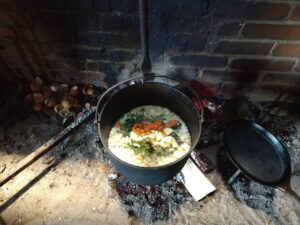
I think the most striking thing I learned was that it’s really hard to stay clean when you’re living like that. We are absolutely, completely spoiled by showers. I spent almost 45 minutes each night, cleaning myself from top to bottom. I didn’t wash my hair with soap every night, but I did wet it down and scrub my scalp with a washcloth. I used soap on all the “important bits” every day. I made sure to thoroughly clean my feet at least once a day, and always before bed. It took a long time, and sometimes I didn’t feel like doing it, but I always felt better after my evening “spitz bath.” Still, when AWA came to pick me up from the Fort after my week, I noted he drove home with the windows open. I cannot tell you the filth that came off me when I showered at home. It was startling, because I really thought I was pretty clean the whole time. I’d made a point of it! But the bottom of the tub told a different story.
I did well learning my beehive oven use. I have now baked about ten or twelve loaves of bread and several pies in the beehive oven, and am comfortable with the use of it. I learned how to close certain windows while bringing the oven up to temperature, because otherwise the wind would whip the smoke down from the chimney and right back into the cabin. I discovered that it doesn’t matter how many windows you close at night, mosquitoes will find their way down the short, straight chimney to eat you. Might as well leave the window open for a nice breeze.
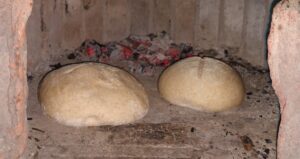
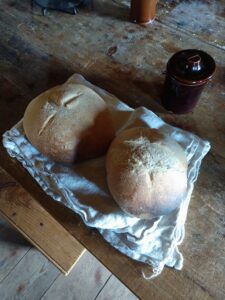
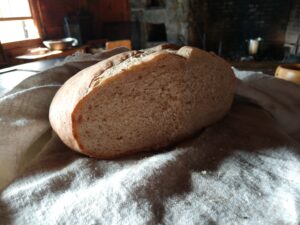
While I was there, I collected all my hardwood ash. It’s my intention to use it to create lye in the autumn, so that I can then make both clothes washing soap (which is sort of soupy and mushy) and body washing soap (which can be in bar form). I hope to make two batches of bar soap, for comparison… one batch made with my homemade lye, and one made with commercially purchased lye designed for modern soap making. My sister makes soap, both lye and other types, and I’ve helped a number of times, so I figure between the two of us we can probably do a great “compare and contrast” for the Fort patrons.

The profound thing I discovered about myself, is that when I am at the Fort and away from the modern hustle and bustle, I am more quiet, more peaceful, and less klutzy. I tend to rush around from task to task, overly busy at all times when I’m at home. I have so much to do between taking care of the house and cooking and kids, writing books, planning events, marketing, helping out AWA with the blog, and the dozen other things I do every day. When I rush, I do stupid stuff, like trip and fall, or cut myself with knives. At the Fort, the pace was just much slower. I had as much or more work to do, honestly, but there was no rush. Part of it was that I was by myself for the majority of the time (school groups and other people were only during open hours, from 10am to 3pm generally). But part of it was just that I knew what needed doing, and I did it. There was no rush. I just had to move along at an even pace, and I did. No trips and falls. No cutting myself. I did get one splinter, but it got dealt with and I was fine.
There’s so much to be learned by doing things “the old fashioned way.” I like doing it because I love taking those old recipes (whether for food, or soap, or whatever) and trying them out. Every time I do something, I learn new stuff, about myself, and about history. Yes, it’s good for learning how to live without modern machinery. But it’s also just good for the soul, in my opinion. Doing things with your hands, getting more in touch with the world we live in, breathing in fresh air and allowing your circadian rhythms to sync up… it’s all good.
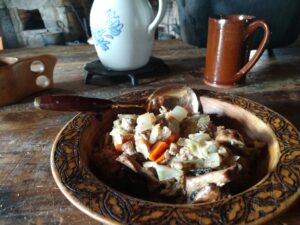
The Fort was designed to teach adults and children about the history of the French and Indian War, and about the colonization of New Hampshire. Perhaps it’s also teaching us about how to live, going forward into our future. I think we’ve lost a lot of knowledge that we used to have. Those people who lived in the original Fort were not stupid. They did amazing things, and without the machinery and computing power that we “cheat” with today. We’ve lost some of that drive. It’s time we got it back.
I’m not entirely sure how to go about injecting that drive into today’s youth, but it’s something I think must be done, and as quickly as possible. My own kids are a mixed bag. I will say that the one who spent the most time “visiting the past” with me is the one with the most insane drive for success and internal motivation. I think that’s something to keep in mind. Allowing children to actually DO things, instead of just reading them or watching them in a video, gives them the opportunity to invest themselves. In order to become a successful person, you have to fail. Without failure, you don’t learn to work as hard. You don’t learn that … that thing which made America such an amazing place when it was founded. People flocked here because with hard work and effort, with blood, sweat, and tears, you could better yourself and your family. That’s not America today, though.
We need more children learning trades, learning to put their personal sweat equity into the work they’re doing. We need more adults teaching it, and yes, pushing it. The stigma of going into the trades should be eradicated, and instead, the plumbers, carpenters, welders, electricians, HVAC folks, and all the others, should be elevated and celebrated. They are the ones carrying us forward, for the most part.

Those pictures of food look scrumptious! Do you plan on posting any recipes?
You’re completely correct regarding learning and practicing primitive living skills. We may need them soon.
I can definitely post some recipes, though I’m also researching for an 18th century cookbook I’m writing, so I don’t want to share them all. 😉 But I’ll pick a handful and post them up now and again. Maybe twice a month recipe?
On the other hand, I’m happy to share out my medieval, Viking, and modern recipes, as I’m not writing them into a cookbook anytime soon. *grin*
Very interesting. Your account took me back to long weekends working around the family property; the elders had passed away, the two houses had become termite farms and in a stage of deterioration that made them uninhabitable, but one building was still in good shape and useful for short term – and unsecure – storage and “camping out under a roof.” Window screening, some 1X2s and some nails provided for open windows without the bugs, cheap kerosene lanterns provided some light, cooking was done over a wood stove, food storage on ice in a cooler, crude disposal facilities (a shovel a modified lawn chair and a pop-up shade cover), water in 15-gallon blue barrels, etc. One thing that stood out was personal hygiene; sun up-to-sun down physical labor in summer heat left one in a condition not conducive for restful sleep, and by dusk each day I was searching for a way to stand upwind from myself. My fix was a pulley, some rope and a 6-gallon bucket equipped with a self-closing shower valve and water saving shower head (this was before I learned about propane-fired Zodi camping equipment, and a reminder that while cowboy movies may be enjoyable entertainment, thankfully the presentations do not include an olfactory component).
RE: your experience with “personal cleanliness inadequacies:” do you attribute that to technique or equipment, or both? Modern soap is quite different from that of the 18th century, showers offer a flushing with clean moving water that no saturated cloth can match, and fresh clothes avoid the dirt retention from re-using garments. We know more, and differently, than our ancestors; do you see a means of reasonably improving the outcome? I suspect not a lot of preppers have devoted much thought to the issue.
Regarding hygiene, I got a new appreciation for it this weekend.
I went to the fort again on Friday to help out with a school group that came through. The director asked if I could bake bread, because many of the children were from severely underprivileged families, and may never have SEEN fresh bread before. So I did bake, in miserably hot weather, but the loaves turned out beautifully. And the kids got to touch the dough and try things out. They also made butter with another interpreter, which was cool.
By the end of the day, when everyone else left and I was alone at the fort and locked in (which is wicked cool I might add), I decided to use the outdoor shower which I only recently found out about. It’s just a cold water hose hooked up to a shower head, with an on/off switch, and a treated canvas “nook” to stand it. But oh my GAWD it was glorious and cool and I felt like a whole different person when I went back into my cabin.
I think it’s the ability to wash yourself so thoroughly with a shower method. Tubs never let you get quite as clean. I think in the time, they were simply more dirty than we are, in terms of natural sweat and oils. We have plenty of evidence that they washed their bodies, heads, “bits,” and hands often enough, but it was bucket washing or tub washing. I suspect that the natural smells, which at no point were ever hidden with deodorants or perfumes, were largely ignored. Much the same way I don’t mind the smell of a cow field or a horse stall. You clean off the DIRT, but don’t worry about what comes natural. Then again, in this very hot weather, I also think they’d have gone swimming in the river, which I didn’t feel safe doing by myself.
For improving the outcome, I actually have a solar shower on a rechargeable battery. You bring out a bucket of clean water, dump the pump end in it, and hang the handle up in a tree or on a pole. Voila, automatic shower. You can make the water as hot or cold as you wish. I didn’t see the point in bringing it to the fort for that one week, mostly because I was wanting to really get into the role of an 18th century woman on the frontier. Going forward, in hot weather I’ll use the cold shower, and in cooler weather I’ll bring my solar hook up and just use the cold shower stall.
A cold water shower – within certain temperature limits – is better than no shower at all. I have a couple rechargeable hand-held shower units that sound like what you have – drop the pickup in water, turn on, and you get a mild spray. I still have – somewhere – that 6-gallon bucket, the auto-shutoff valve and cheap water saving shower head from decades ago. Just in case…..a few years before the 2004 Hurricane Trifecta I had discovered the Zodi units, and now have a spare (two is one, one is none). I’ve done the “bath in the lake” thing a number of times and it convinced me that tubs, of any size, just aren’t as effective as a running water spray.
I suspect that, for various reasons, our ancestors accepted a lot more dirt, and more odors, simply because there wasn’t an easy way to live otherwise. Grandma had, I was told, one of the first Maytags around, powered by a 2-cycle gasoline engine and thought it was great (by the time I came along it had been replaced by an electric one) also by which time the farmhouse – built in the 1880s – had been modified by taking space from one upstairs bedroom to create a very small bathroom with tub, toilet and sink, evidenced by the cast iron drain pipe being run outside the house. I suspect electricity was the primary driver because it offered the ability to pump water from a second well (the first one still existed – a hand pump that was part of the kitchen sink). I do remember, when I was very young, each spring the men of the family hauling the wood stove outside each spring to a lean-to to keep the house cooler during the summer, and the “kids” buying their mother an electric stove and having the wiring put in for it (electric lights had already been added, but only one two-bulb ceiling light and one wall outlet per room, all with surface-mounted conduit).
What daily life was like before all those improvements, I do not know; I am confident it was not the slightest bit like what Hollywood presents because, as romantically as it may be portrayed, even a camping weekend hauling water in buckets and heating with a wood stove is a PITA of the First Order.
Some years back I was reading an article in which a woman asked her mother which kitchen which appliance she would least like to do without; the mother replied “running water.”
Fort #4, I remember that place name. It shows up near the end of a wonderful novel, “Look to the Mountain” by LeGrand Cannon. That’s set in NH, in the years leading up to the Revolution. It centers on a young man growing up in Bedford (then called by another name) who marries and heads up the river into the NH wilderness. He settles near Mt. Ossipee, either first or second in that town, 30 miles (?) or so from the nearest neighbor. We read how he has to stake his boundaries, clear some land, build a home (12 by 12, I think, if not smaller), and wondering whether to include in it the “luxury” of a chimney. There’s lots more. As a description of many details of just how hard pioneering is, I found it beyond compare.
Near the end, he hears of the Declaration of Independence and walks to Fort #4 to enlist. I think that’s a 50 mile walk.